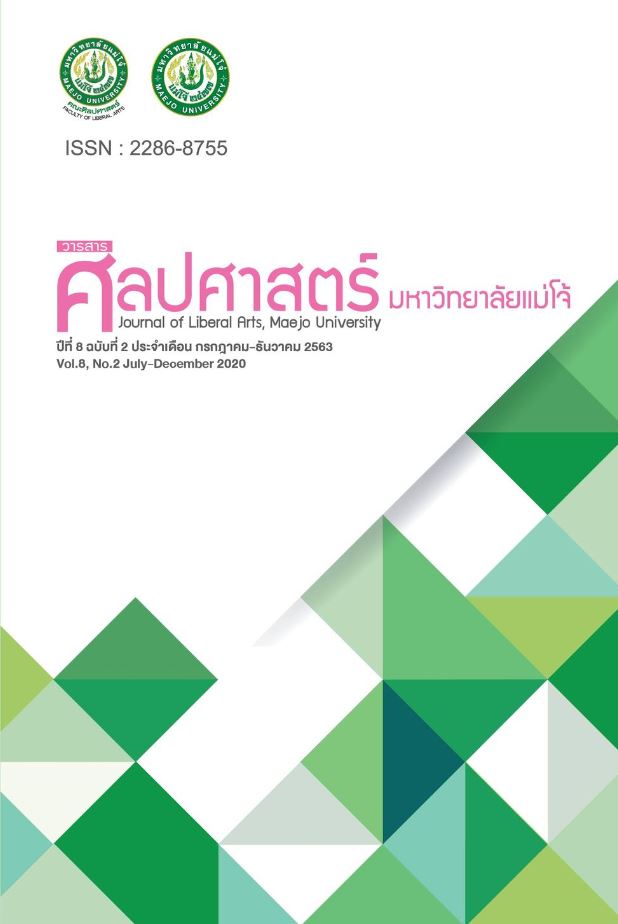The Effects of Project-based Learning in an EFL Classroom
Main Article Content
Abstract
This research study was designed to study the effects of project-based learning (PBL) in an EFL classroom. The objectives were to investigate the effects of PBL on students’ critical reading skills and its relation to other areas. It also aimed at studying students’ attitudes toward participating in PBL. The participants were 50 fourth-year students majoring in English. They were divided into two groups: an experimental group and a control group. The experimental group was taught using PBL while the control group was taught using the traditional method. The instruments in this study included tasks, a critical reading skill test, questionnaires, group reports, and an interview. Mean scores, standard deviations, and the t-test analysis were used to analyze the quantitative data while content analysis was used to analyze the qualitative data. The results revealed that the critical reading skills of students in the experimental group were significantly higher than that of the control group at 0.5 level. In addition, on average students had highly positive attitudes toward PBL. The results also showed that PBL benefited students’ other areas including collaboration skills, IT skills, communication skills, and self-esteem. This study pointed out the potential in applying PBL in an EFL classroom.
Article Details
References
83: 39–43. doi: 10.1080/00098650903505415.
Buck Institute for Education. (2003). What is PBL? Retrieved from https://www.bie.org/about/what_pbl
Burns, R. (1997). Introduction to research methods (3rd ed.). Melbourne: Addison Wesley Longman.
Coufalová, J. (2006). Projektové vyučování. Praha: Nakladatelství Fortuna.
Dewey, J. (1997). Experience and education. New York: Touchstone.
Epstein, R. L & Kernberger, C. (2006). Critical Thinking. Belmont, CA : Thomson-Wadsworth.
Eskrootchi, R., & Oskrochi, G. (2010). A study of the efficacy of project-based learning integrated with
computer-based simulation - STELLA. Educational Technology & Society, 13(1), 236–245.
Frank, M., & Barzilai, A. (2004). Integrating alternative assessment in a project-based Learning course
for pre-service science and technology teachers. Assessment and Evaluation in Higher
Education, 29(1), 41-61.
Frey, K. (1996). Die project methode. Weinheim: Beltz.
Friedman, T. (2007). The world is flat 3.0: A brief history of the twenty-first century. New York, United
States: Picador.
Kloppenborg, T. J., & Baucus, M. S. (2004). Project management in local nonprofit organizations:
Engaging students in problem-based learning. Journal of Management Education, 28, 610-630.
Klein, Joel I.,Taveras, S, King, S. H., Commitante, A, Curtis-Bey, L, & Stripling, B. (2009). Project based
learning: Inspiring middle school students to engage in deep and active learning. New York:
NYC Department of Education.
Krajcik, J., Czerniak, C., & Berger, C. (1999). Teaching children science: A project-based approach.
Boston: McGraw-Hill College.
Lou, S., Shih, R., Diez, C., & Tseng, K. (2011). The impact of problem-based learning strategieson STEM
knowledge integration and attitudes: An exploratory study among female Taiwanese senior
high school students. International Journal of Technology and Design Education, 21, 195-215.
Markham, T., Larmer, J., & Ravitz, J. (2003). Project-based learning handbook: A guide to standards
focused project-based learning for middle and high school teachers. Novato, CA: Buck Institute
for Education.
Minev, M, Petrova, B, Mineva, K, Petkova, M, & Strebkova, R (2018). Self-esteem in adolescents. Trakia
Journal of Sciences, 2, 114-118.
Miri, B., David, B.-C., & Uri, Z. (2007). Purposely teaching for the promotion of higher-order thinking
skills: A case of critical thinking. Research in Science Education, 37(4), 353-369.
Moss, D. & Van Duzer, C. (2005). Project-based learning for adult English language learners.
Retrieved from http://www.cal.org/caela/esl_resources/digests/ProjBase.html
The Office of the National Education Center. (1996). The national education policy 1997-2001 (No.
8). Bangkok, Thailand.: Atthapornkarnpim.
The Office of the National Education Commission. (2000). Learning reform: A learner-centred
approach. Bangkok: Watana Painit Printing& Publishing.
Panasan, M., & Nuangchalerm, P. (2010). Learning outcomes of project-based learning activities.
Journal of Social Sciences, 6, 252-255. Bangkok, Thailand: Ministry of Education, Watana Panit
Printing & Publishing.
Papastergiou,M. (2005). Students’ mental models of the Internet and their didactical exploitation in
informatics education. Education and Information Technology,10(4),341–360.
Patton, A. (2012). Work that matters: The teacher’s guide to project-based learning. London: Paul
Hamlyn Foundation.
Ponsarum, P., & Thephasdin Na Ayuthaya, W. (2001). Educational reform in tertiary education:
Developing learning process in university level. Paper presented at the Research: The Way to
the Success of Educational reform, Faculty of Education, Chulalongkorn University, Thailand.
Stoller, F. (2013). Establishing a theoretical foundation for project-based learning in second and foreign
language contexts. In G. H. Beckett & P. C. Miller (Eds.), Project-based second and foreign
language education: Past, present, and future (pp. 19-40). Connecticut, USA: Information Age
Publishing Inc.
Svobodová, R., Lacko, B., Cingl, O. (2010). Projektové rízení a projektové vyučování, aneb, Jakna
výukové projekty podle zásad projektového rízení. Chocen: PM Consulting
Taddei, L. (2013, August 23). Encouraging creativity and innovation in yourself and your students.
Retrieved from: http://www.facultyfocus.com/articles/facultydevelopment/encouraging-
creativity-and-innovation-in-yourself-and-your-students/
Taglieber, L. K. (2008). Critical reading and critical thinking. Ilha do Desterro: A Journal of English
Language, Literatures in English and Cultural Studies. 44, 141-163.
Tripatara, A. (2000). Teaching methods that encourage student thinking. Journal of Learning and
Teaching Competency, 9(1), 10-19.
Vallis, G. (2010). Reason to write: Applying critical thinking to academic writing. North Calorina: Kona
Publishing and Media Group.
Verma, A., Dickerson, D., & McKinney, S. (2011). Engaging students in STEM careers with project-based
learning-Marine Tech Project. Technology and Engineering Teacher, 71(1) 25- 31.
Wilhelm, J., Sherrod, S., & Walters, K. (2008). Project‐based learning environments: Challenging pre‐
service teachers to act in the moment. The Journal of Educational Research, 101(4), 220‐233.
Wasi, P. (2000). Preambles. In Office of National Education Commission (ONEC) (Ed.), Learning reform:
A learner-centred approach (i). Bangkok, Thailand: Watana Panit Printing & Publishing.
Wiratchai, N. (2002). Reforming process for learning quality development assurance and assessment
Bangkok, Thailand: Office of the National Educational Commission (ONEC), Office of
the Prime Minister.

